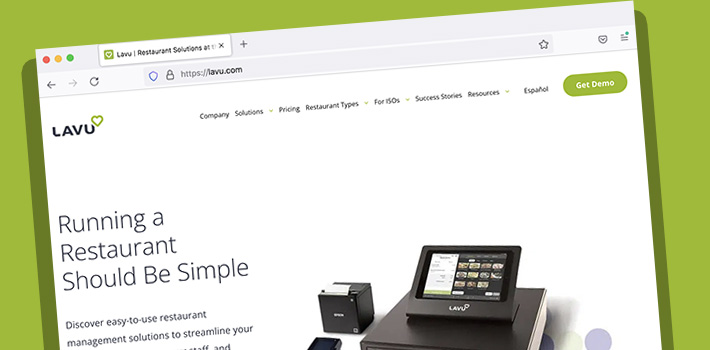Broker Fair 2022 Photos
October 25, 2022The Broker Fair 2022 Photos can be FOUND HERE. Thank you so much to all the sponsors and attendees!

Ready for what’s next? deBanked returns to Miami Beach on January 19th! Registration is now open. For questions, email events@debanked.com.
Lavu Adds MCA Product Through Partnership With Parafin
October 7, 2022 It’s not just DoorDash that Parafin has partnered up with to provide MCA funding. Last week, the restaurant software company Lavu launched Lavu Capital to help restaurants owners access capital.
It’s not just DoorDash that Parafin has partnered up with to provide MCA funding. Last week, the restaurant software company Lavu launched Lavu Capital to help restaurants owners access capital.
“We are a restaurant software company that focuses on small and medium restaurants,” said Saleem S. Khatri, CEO of Lavu. “Think of your favorite restaurants that have one or two locations that are really really popular, that are ingrained in the community. We do everything from point of sale to online ordering, payment processing, and anything a restaurant would need to start and grow their business.”
Khatri said that one thing they noticed is that these restaurants have a fundamentally hard time getting loans and that led them to connect with Parafin. Parafin’s product is an advance on future sales, not a loan, and their offerings have been simply integrated into Lavu’s technology. Parafin automatically generates an offer for restaurant owners that they can see in their Lavu dashboard.
“…it’s just really beautifully designed,” said Khatri. “It basically says, ‘Hey, you have an offer to borrow up to $5,000. Do you want it yes or no?’ And you just click ‘yes’ and you’re good to go, the money deposits straight into your bank account, and then you have a repayment schedule. And it just pulls it directly from your bank account according to that repayment schedule.”
Khatri says they haven’t really begun to market the product yet and they’ve just started off with a limited base of customers but that the plan is to roll it out to all their customers around the US. They’d even do it with their customers outside of the US if they could, but the tech is not set up to do that just yet.
“This is going to be a feature and an offering that really really benefits our customers because it gets to the heart of what they need, which is they’re in constant need of liquidity, they’re in constant need of kind of tools to run their business better,” Khatri said. “And it just really fits our portfolio of products that we offer to these customers. So the reception has been awesome.”
Think The New California Disclosure Law is Just About a Disclosure Form? Think Again
September 13, 2022 “We’re one of the good guys so of course we’ll comply and include the form with our contracts.”
“We’re one of the good guys so of course we’ll comply and include the form with our contracts.”
Variations of the above phrase have been oft-repeated in the last few months by participants in the commercial finance industry when queried by deBanked about California’s new disclosure law. Several companies have shared that they are prepared for what’s to come, but are they? The regulations go into effect on December 9th and begin a new chapter of compliance for the industry.
Though one might be aware that California will require specific disclosures on commercial finance contracts (including purchases of future sales), Katherine C. Fisher, Partner at Hudson Cook, LLP, explained that the breadth of the state’s law will likely require changes to a funding company’s operational processes as well. Fisher told deBanked that there’s not just the matter of disclosing but also the matter of what triggers a disclosure having to be made. What might otherwise be considered the normal discourse between a funding provider and a customer prior to a deal being consummated is now an area requiring close examination.
“If a broker sends a text to a merchant with the offers, could it trigger this?” is one scenario she posed about the threshold for disclosure.
The funding provider needs to know the answer because once the disclosure requirement is triggered, the broker needs to relay back the details of the offers made, the specific disclosures provided, and the timestamp of when this took place. All of this data then needs be stored by the funding provider to maintain compliance.
And funding providers will need to be vigilant.
“The funder is responsible for broker compliance,” Fisher said.
The entire process of who-said-what, when, and how will suddenly become a realm requiring tight control it seems. And that all comes back to the form itself, which is not all that simple either.
 California will require funding providers to estimate an APR on a purchase transaction using one of two methods: the Historical Method or the Underwriting Method. While the methodology selected is probably best left to qualified counsel to assist with, the likely deviation of a future estimated APR from a backwards-looking APR was a reality considered by state regulators. To bridge this gap, California requires that funding providers disclose reasonably anticipated true-up scenarios. A true-up in this instance refers to the already well-established option for a merchant to perform a monthly reconciliation of payments if the amount collected is above or below the purchased percentage specified in the contract.
California will require funding providers to estimate an APR on a purchase transaction using one of two methods: the Historical Method or the Underwriting Method. While the methodology selected is probably best left to qualified counsel to assist with, the likely deviation of a future estimated APR from a backwards-looking APR was a reality considered by state regulators. To bridge this gap, California requires that funding providers disclose reasonably anticipated true-up scenarios. A true-up in this instance refers to the already well-established option for a merchant to perform a monthly reconciliation of payments if the amount collected is above or below the purchased percentage specified in the contract.
Though the very nature of the reconciliation is a consequence of not being able to predict the future exactly, California’s law requires that funding providers disclose the dates and amounts of the true-ups that they reasonably anticipate. Such concepts and mathematics, once perhaps the subjective domain of a funding provider’s in-house underwriters will soon be subject to regulatory scrutiny for total accuracy. And this just scratches the surface.
The scope of this law is so unique and technical that the Hudson Cook law firm spent a considerable amount of time preparing a guide on this very subject. deBanked saw some of the pages of this guide during a call.
Fisher, meanwhile, insisted that compliance in California is different than compliance with the law recently enacted in Virginia and that if funding providers wait until December to begin preparing, it will probably be too late to be ready in time.
“This is more than just a form,” Fisher said. “You need to spread the word about it.”
Why is a Recession Good for the MCA Industry?
August 30, 2022
 The MCA industry has strived for many years to overcome tremendous challenges. Interestingly, many in the industry – especially the many new “rookie funders” – are very nervous about the looming recession. In this article, we will attempt to calm nerves and delve in detail about how high inflation rates have affected the MCA space. More importantly, we will address how the inevitable recession will actually be good for the industry – if we play it right.
The MCA industry has strived for many years to overcome tremendous challenges. Interestingly, many in the industry – especially the many new “rookie funders” – are very nervous about the looming recession. In this article, we will attempt to calm nerves and delve in detail about how high inflation rates have affected the MCA space. More importantly, we will address how the inevitable recession will actually be good for the industry – if we play it right.
A Changing Environment
Funders and ISOs alike must be superefficient in working within the MCA guidelines, so they can avoid collapsing in the coming recession. The MCA game has drastically changed in recent years. The product, the rules, the accepted norms, and even the actual laws have changed. It is only natural that many of the “new funders” won’t have a complete grasp of the very original merchant cash advance product, and what made it work. Unless a funder has a complete understanding of why and how something works, they won’t know why and how it cannot work. Before we directly address the status of the current inflation, and discuss how to prepare for the recession, lets briefly go back and talk about the original merchant cash advance product.
The Monkey’s Ladder
It reminds us of an old parable where a scientist placed a ladder with a bunch of bananas on top of it, in the center of a cage full of monkeys. Whenever one of them attempted to climb the ladder, the scientist sprayed all of the monkeys with icy water. Eventually, whenever a monkey took a first step onto the ladder, the others would pull him off and give him a beating, because they wanted to avoid the icy water. The scientist then substituted one of the monkeys with a new one, who naturally jumped on the ladder as soon as he entered the cage and noticed the bananas. He immediately received a proper beating and learned to never go up the ladder – but he never learned why. Eventually all the monkeys were replaced, and the new monkeys learned not to climb the ladder, but no one knew why. Here, we will attempt to inform our new monkeys, I mean funders, about why we do things the way we do. When the recession finally hits, at least they will know to prepare a raincoat before the icy water hits them in the face.
Bob’s Pizza
The original merchant cash advance recipient was a hard-working pizza shop owner named Bob. Unfortunately for him, his oven broke, and the replacement cost was ten thousand dollars. Bob didn’t have good enough credit for traditional financing options. Of course, without a pizza oven Bob’s business faced an imminent demise. As a last-ditch effort, he contacted a factoring company, who funded businesses with their existing receivables, and asked if they would consider funding “future” receivables. The funder reviewed Bob’s file and immediately identified Bob’s bad credit, which was why no bank wanted to take a risk on Bob’s Pizza. The funder calculated that if the big banks had been able to legally charge a much higher APR, they may have taken the risk on Bob after all. The reality – it was the funding price that limited Bob’s credit options, not his bad credit.
This funder happened to be a “softy” and since the factoring industry was not limited to what the usury laws allow, he decided to come up with a solution that worked for both parties. To make the long story short, the funder offered to take a risk and fund the crucial pizza oven, by purchasing the future sales of Bob’s pizzas. The funder would do this if Bob was willing to pay a 1.49 factor rate, and let the funder draw a small percentage of Bob’s daily sales as payment. The funder determined that the pizza shop generated enough sales to cover the cost of the oven by paying just a small percentage of the running daily sales.
The funder believed the risk was minimal, and the rate balanced out the risk that Bob’s Pizza would default before the oven was paid off. Bob figured out that the cost for the oven was not ten but fifteen thousand dollars because of the funding arrangement. Bob believed it a relatively small charge to pay the additional five thousand dollars, in order to get the ten thousand dollars needed to buy his oven. After all, without the oven, his business would fail.
MCA in the Post-Covid19 Era
A lot has changed since Bob received the first MCA. For the purposes of this inflation-recession conversation, let’s skip to the current post-Covid19 era of the MCA space. First, the basic economic concept involved is that the need for a high-cost funding product such as an MCA peaks when interest rates are generally high and there’s a tight credit market on main street. Those in the high-risk bracket will find it even more difficult to obtain financing, and will seek out an MCA. Reversely, the demand for the MCA product is lowest when interest rates are low, and it is easier for a business to access credit. Even if Bob himself doesn’t have direct access to credit, if the oven supplier has easier access to financing, they will offer an in-house finance option directly to Bob. He won’t need to sell his future pizza pies at 1.49 factor rates for an MCA funder to replace his pizza oven.
How do these basic foundational MCA concepts line up with actual historical events in the space? The economic boom leading up to Covid19 saw record low interest rates and unemployment, which caused a drastic drop in the demand for high-cost funding. In reaction, the MCA space normalized stacking. As a direct result of the imbalance in supply and demand, funders added the option to fund multiple positions. Post-Covid19, the government issued many rounds of PPP and EIDL loans, and the demand for MCA money plummeted to the lowest point in the history of the industry. This also explains the high inflation rates we currently experience. With easier access to money, more people spend more money, which drives up the prices to access money, through the old economic law of supply and demand. However, by this theory, we should have seen a sharp decline in the number of MCA funders. Unexpectedly, the outcome has been the opposite. Since Covid19, funders have opened at a rate faster than ever seen before in the MCA space.
In fact, the opening of brand-new funders has proportionally outpaced the opening of brand-new merchants.
Investing Changes Post-Covid19
The reason for this outcome is simple. When more people have access to money, more people invest money. A lot of people choose cryptocurrency as their easy ride to riches, others have an appetite for the MCA space. Each time a funder opens shop, they add to the overall supply within the MCA space, which aggravates the already stressed demand imbalance. The new funders who came into the space carrying large bags of money from investors weren’t willing to simply return the unopened bags – they wanted to fund. To overcome the lack of demand, these new funders relaxed the underwriting standards. It is now normal to see new funders advertise “we fund defaults.” As a result, many lead generators have stopped creating leads for new merchants. Instead the focus is officially on UCC filings, defaults, etc. These people are basically saying they have given up on expanding the MCA market share, and rely on rerouting the same leads over and over like the game of musical chairs.
A New Era For Bob
Not so long ago all reputable funders funded only 1st positions. Now many of the new funders officially do not fund 1st positions, they only fund a merchant who is a proven payer to a big funder. By this logic, Bob would not have received funding for his pizza oven from most of the new funders. But the truth is that Bob was helped many years ago, and wouldn’t need funding in the current environment, after he wisely saved his PPP and other loans. But, given that he once received an MCA, a lead generator dug him up and Bob was a fresh lead once again.
After receiving many unsolicited offers, Bob realized that the supply and demand imbalance had flipped the game upside down. This was a new era where the demand for merchants was higher than for funding. With such feelings of empowerment, Bob couldn’t resist the offers and decided to take a deal. However, he was determined not to touch the funds. Bob decided to use the funds only to make the payments and build solid MCA credit for a rainy day. The UCC filing chasers picked up on Bob’s situation, and guess what, within a few short weeks, Bob was receiving 2nd position offers.
At first Bob relentlessly refused the offers. He didn’t feel comfortable committing too much of his daily sales that he needed for rent, payroll, and pizza ingredients. Bob soon realized that in the current MCA era, as long as he maneuvered to move his money around so that his bank statements met the new robotic guidelines of the funders, they would keep funding and renewing him. In fact, given the current state of affairs, Bob now realizes that zero of his actual pizza sales need to be committed, since the many funder’s positions and renewals provide plenty of resources to cover the daily payments, just like an efficient Ponzi scheme.
The Effect on Competition
The tricks to artificially force more demand within the same group of merchants was not exercised by the smart and disciplined funders. Many of the big funders officially slowed down on funding. They haven’t provided a detailed explanation about why they are issuing a lot more declines than usual. Some of the big funders choose to battle with the new funders by competing with them. Those big funders, being fully aware that the new funders shy away from 1st positions, also know that when a new funder receives a bank statement with a daily payment to a big reputable funder, it is almost an automatic certainty that the new funder will want to fund a 2nd position, and 3rd, even a 4th position, etc.
Therefore, the big funder has every reason to go ahead and fund it, considering that the merchant will certainly pay the 1st position to qualify for the many more positions to come. However, the big funder is limited to their publicly advertised policies. They now face a problem trying to even get these types of fundings. If one of their “partners” happens to submit such bad paper, they can’t lower themselves to fund it, because they don’t want to admit to their ISOs how desperate they really are.
To overcome these limitations, those big funders who choose to compete with the new funders open their own little “new funder shops.” These anonymous “new funders” do not have any obligations to the big and reputable ISO shops. These new funders accept all ISOs and all paper. This provides an underground tunnel where the big funder can take part in the slum of the MCA space, where demand for high-priced funding is always rampant, despite the laws of economics. Those big funders then take the data from their very own “new funder shops” and backdoor them back to their “big company.” The submissions are then funded as a 1st position to create an illusion of an excellent file, funded by a reputable brand name funder. Of course, this merchant will receive many offers for many more positions which will provide plenty of cash flow to pay the big funder’s 1st position.
These “big funders” will also at times utilize their “new funder” shops to compete on 2nd and 3rd positions. They will ultimately use the same trick to drop a deal to this merchant from their big company, and rely on the “real new funders” who will undoubtedly jump in to act as reliable cleanup hitters, and drop even more cash to drive the other positions home.
Bob’s New Business
By now Bob no longer operates a genuine pizza shop. He simply does not have the time to manage that business, and quite frankly he doesn’t have to. Bob is now an entrepreneur, with various companies and bank accounts, all of which are of course related to the pizza industry. The influx of funding has given Bob an opportunity to walk away from the hot oven and focus on business – the MCA kiting business. MCA kiting is a phrase coined by OPV. The term is derived from a similar practice in the banking industry known as check kiting. It is a form of fraud where a check is intentionally written for a value greater than the balance in the account. Then a second check is written on a different account, to cover the non-existent funds in the first account. This falsely inflates the balance of a checking account, to allow written checks to clear that would otherwise bounce.
The sales on Bob’s banks statements no longer consist of small amounts that shoppers drop for a slice. We now see large deposits and large expenses coming and going as transfers wires, etc. Bob now even imports and exports flour from international flour mills, which explains the large offshore wires.
Bob remembers the days of working hard in a Pizza shop, so he is determined to do the right thing and keep making money from his new companies. Bob studies the guidelines from the various funders, and he makes sure not to mess up. He is an excellent merchant with a perfect MCA payment history. If Bob keeps the process moving forward, he can get funding every few weeks, skim off the top and save the rest for payments until the next advance. This can mathematically go on and on for a long time, where the funders keep paying the merchant to make payments.
The only time this could become an issue for Bob is if the new funders stop opening new shops and the influx of fresh supply comes to an abrupt halt.
The Impact of a Recession on MCA Kiting
Some economists in the MCA space have expressed concern that the upcoming recession will affect the merchants’ sales, and force them to default on their payments. However, this is not a major concern for the legitimate merchants, since many of them are in essential business markets that will not experience a substantial drop in sales, and thus won’t be greatly affected by a recession. But – it is a huge concern for those in the MCA kiting business like Bob. When the recession hits and interest rates rise to rates not seen in a century, investors will be stressed to the max and seek to pull the “huge profits” that they made in the MCA space. There won’t be an influx of new funders that can be relied upon to bail out the previous positions.
As those MCA-kiting merchants collapse, so will the funders who heavily relied on that part of the market share within the space.
Surviving The Recession
On the other hand, the recession will bring major relief and recovery to those funders, new and old, big and small, who were disciplined throughout the inflation period when demand was low. As mentioned earlier, the reason for high inflation rates is easy access to cash. In order to curb inflation the government will raise interest rates to induce lower inflation, which will restrict the easy access to cash. This will usher in a new era of legitimate merchants that find themselves trapped in a credit crunch, who will seek out the MCA option just like Bob did all those years ago.
During these volatile times it is important to always be mindful that your network is your net worth. As a funder, if a large portion of your portfolio consists of merchants who are playing the MCA kiting scheme, then prepare a raincoat for when the recession hits. On the other hand, if you are a funder that remembers why we do not climb the ladder for the bananas, then you are in a perfect position to survive the upcoming recession. The same goes for ISOs, where building solid relationships with solid companies will be the difference between failure or getting a win during the next great recession.
Funders Weigh in on the New Disclosure Law in Virginia
August 10, 2022 “I think there are pros and cons on this law,” said Boris Kalendarev, CEO at Specialty Capital, in regards to the recently enacted sales-based financing disclosure law in Virginia. “I’m on the pro side and I think first and foremost it allows the good funders and the good brokers in the space to operate in the right manner.”
“I think there are pros and cons on this law,” said Boris Kalendarev, CEO at Specialty Capital, in regards to the recently enacted sales-based financing disclosure law in Virginia. “I’m on the pro side and I think first and foremost it allows the good funders and the good brokers in the space to operate in the right manner.”
The law technically went into effect on July 1st, shaking things up for funding providers and brokers alike, particularly through a set of uniform disclosures that are required every time a contract is put in front of a Virginia-based business.
“It holds a broker more responsible for the transaction that they’re going to complete,” said Sharmylla Siew, Senior Underwriter at Lending Valley. “It builds a deeper bond between the broker and the merchant. And it also creates a better bond between the broker and the funder.”
Echoing Siew’s perspective, Kalendarev also believes that being clear creates an honest business space for the broker, merchant, and funder.
“I think transparency is really the right way to run this business. Let’s try to make sure there’s even more transparency,” said Kalendarev.
One intent behind the law is to provide the business customer with all of the pertinent information in a digestible format. Notably, this includes the commission that a broker may be receiving from the funder.
 “I do believe that it should be fully transparent on both sides to understand the transaction in full,” said Dylan J. Howell, CEO of Liquidibee. “The merchant should understand that the broker is getting compensated. And if he decides that the broker deserves an additional commission on top of what he’s getting paid from the funder, well, that’s an informed decision between the merchant and broker to come to an agreement with.”
“I do believe that it should be fully transparent on both sides to understand the transaction in full,” said Dylan J. Howell, CEO of Liquidibee. “The merchant should understand that the broker is getting compensated. And if he decides that the broker deserves an additional commission on top of what he’s getting paid from the funder, well, that’s an informed decision between the merchant and broker to come to an agreement with.”
Howell Suggested that some of what is required would be expected in other types of deals.
“If you would go out and buy a $500,000 house, you get to the closing table and you look at the bill, it says it’s $545,000, but the purchase price is 500,000, you would want a reconciliation page to show where that 45,000 of additional capital is going,” Howell said. “And it’s no different than in this transaction, in my opinion.”
Banks and credit unions were exempt from the law but some view targeted regulations like this one as a way to raise the bar and credibility of sales-based financing products in general.
“Merchants who wouldn’t have considered an MCA as a practical form of funding in the past may decide to explore this avenue knowing that the industry is being held to a higher standard of practice,” Howell said.
Siew, of Lending Valley, echoed same.
“I am actually very excited about the new regulations, and I feel that it would make a huge impact on the MCA industry,” she said.
Clearco Announces Major Layoffs, Paints Gloomy Picture
July 29, 2022Clearco, the international small business funding company led by celebrity CEO Michele Romanow, announced it was laying off 125 employees on Friday. Romanow shared the news on social media in an overall gloomy message about the business’ state of affairs. For one, the company says that Clearco is currently “considering strategic options” for its international operations.
In a letter from Romanow and Executive Chairman Andrew D’Souza, they state:
The short answer is the current macroeconomic environment looks very different today than in 2021. We have rising interest rates not seen since the mid-90s, the highest inflation in four decades, one of the biggest swings in European currency since the founding of the Euro, all compounded with a slowdown in e-commerce growth that’s been well documented and continued supply chain issues for companies of all sizes.
We were building to match the growth of the economy and now face significant headwinds that simply didn’t exist six months ago. We grew our headcount too quickly in anticipation of continued economic growth and that decision rests on us alone.
After assessing the current market conditions and uncertainty we’re seeing across the e-commerce sector, this was the most prudent action to take and was necessary to:
1. Ensure we’re able to support as many founders as possible, today and in the future, in their growth journey and;
2. To come out of this economic downturn a sustainable and profitable company.
Shopify Capital Originated $416.4M in MCAs and Loans in Q2
July 27, 2022 Shopify Capital originated $416.4M in funding to small businesses in Q2, the company announced. That was spread across the US, Canada, and the UK. The figure represented a large increase over the $346.7M in Q1.
Shopify Capital originated $416.4M in funding to small businesses in Q2, the company announced. That was spread across the US, Canada, and the UK. The figure represented a large increase over the $346.7M in Q1.
Although its funding business grew, the overall parent company announced that it was laying off 10% of its employees. The CEO explained that this was a correction to its expectations that pandemic-driven e-commerce sales would continue to soar for a long time, but that they have instead slowed.
DailyFunder Marks 10 Year Anniversary
July 26, 2022 The DailyFunder.com domain was registered ten years and 1 month ago. Formed two years after the debut of deBanked, DailyFunder went on to become the most active small business finance community in North America. The forum has generated more than 160,000 posts and has more than 12,000 members. It has regularly surpassed two million page views per year.
The DailyFunder.com domain was registered ten years and 1 month ago. Formed two years after the debut of deBanked, DailyFunder went on to become the most active small business finance community in North America. The forum has generated more than 160,000 posts and has more than 12,000 members. It has regularly surpassed two million page views per year.
“There is no doubt that the DF has impacted the trajectory of the industry over the last decade,” said Sean Murray, who founded it. “The site receives thousands of visitors per day. In the early years it ushered in an era of broker commission transparency.”
Murray recalled a time when sales agents were not always aware that there were even commissions being paid at all.
“There were reps who thought that they had to charge merchants a separate fee in order to earn anything at all,” Murray said. “And their bosses were taking 50% of that. When I would bring up commissions, they’d be like ‘wait, the funders are paying my boss for these deals too?’ and I’d be like ‘how do you not know this?’ Widespread communication via the forum eliminated a lot of the secrets.”
One of the most popular categories on the forum in more recent times has been the Deal Bin, where brokers try to find placement for deals. It’s recorded more than 41,000 posts.
“Ten years is a lifetime as far as I’m concerned,” Murray said. “Love it or hate it, everybody knows the DF. If you’re a lender or funder, your brokers are lurking on there whether they admit it or not.”






























